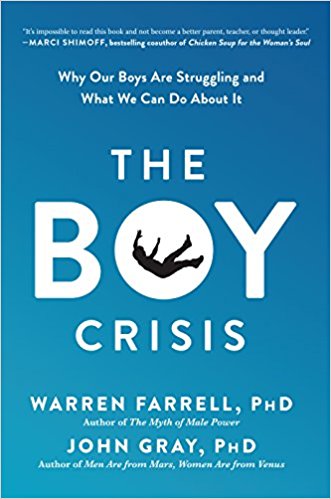
Boys' next sense of purpose: 'Father warriors'
Opinion - by Dr Warren Farrell The Washington Examiner, Washington, USA, Sunday, June 14, 2019
With Father's Day approaching, we are in need of clarifying how the role of dads in the past and present can prepare us for developing the best dads for our children's future.
Historically, each generation had its war. In each generation, a boy received "social bribes" such as being considered a "hero" if he risked dying so others could live. He soon absorbed that if he risked being disposable, his parents would be proud and that girls were more attracted to an "Officer and a Gentleman" than a "Private and a Pacifist." Serving either in war, or as his family's sole breadwinner, gave a boy his mandate for manhood - his "sense of purpose" as a man.
Today, the good news is both that fewer boys are needed to be disposable in war and that more women are sharing the burdens of the breadwinner role. The bad news is that this has left many boys with a "purpose void." As boys with a purpose void have become less-motivated men, more women are interested in having children without having "just one more child I have to support." Additionally, more children of divorce are raised without dads.
The result has been a global boy crisis in all 56 of the largest developed nations: of boys falling behind girls in virtually every area of academic achievement, mental health, physical health, and economic competence. But there is a gap: Boys with two involved parents are doing fine; boys whose dads are absent are not.
If the boy crisis resides where dads do not reside, this creates a new opportunity for consideration this Father's Day: Our sons can fill their purpose void by being honored as warriors not just if they risk killing and being killed overseas, but also if they become "father warriors" by loving and being loved at home.
As we have seen in each generation's war, boys will risk death if they are told they are needed. Boys need to know they are needed as dads and why. My research differentiates about seven important differences between "dad-style parenting" and "mom-style parenting," such as a dad's greater tendency toward roughhousing, coaching, prodding their children beyond their comfort zone - even if by teasing. Children with both styles, with "checks-and-balance parenting," do the best. But boys (and their sisters) need to understand why "dad-style parenting" is also pivotal.
For today's dads and future dads, instead of having to prepare their sons to be disposable to be honored, they can guide them to find a sense of purpose with a dream that reflects their unique personality. However, a boy who discovers his dream without the discipline to fulfill that dream will continue failing and soon stop dreaming.
"Dad-style parenting" tends to generate that discipline with less boundary-setting and more boundary enforcement. Take roughhousing. Many mothers see a roughhousing dad as one more child she has to monitor. Her fear that someone is likely to get hurt, though, is only about 99% likely to be right!
But we now know that Dad's roughhousing (or Mom's roughhousing) done well leads to empathy, assertiveness-without-aggression, and social skills that develop motivated and happy children. The process begins by the parent's roughhousing creating a bond with the children. And now, after, let's say, Krista has cried when Brandon pushed her aside, Dad can use the leverage of that bond to warn Brandon that if he does that again, the wrestling will stop. Brandon is now required to think of his sister's needs in order to fulfill his own. Studies show that the more time spent with Dad, the more empathetic children are likely to be. Roughhousing combined with Dad enforcing boundaries are two reasons why.
The boundary enforcement requires the children to focus on what they need to do (be sensitive to their brother and sister) in order to get what they want (more roughhousing). This creates postponed gratification, the single biggest predictor of success.
A boy without the discipline of postponed gratification often slides down a slippery slope into the boy crisis. Instead of finishing homework, or rehearsing for a sport or a play, he gets easily distracted. He fails and feels less respect from friends, teachers and parents. He feels ashamed of himself and depressed; he escapes at the end of a needle or by addiction to video games or porn. In worst-case scenarios, he commits suicide, or, angry at being invisible and unappreciated at school, orchestrates a mass shooting, making others "wish they had paid attention to me."
Children who do especially well have parents who engage in checks-and-balance parenting: respecting the positive contributions of each parent's style and communicating non-defensively as they apply both parenting styles.
Our sons need to know the power of dad-involvement. Dad deprivation is the most significant predictor of male suicides, whose current rate is three times that of girls between age 15 and 19, and 4.5 times that of girls between 20 and 24.
Dad-deprivation is at least five times more important than any other factor in making a child vulnerable to drug abuse. It predicts obesity, video game addiction, and attention deficit hyperactivity disorder. Dad-deprived boys are much more likely to drop out of high school and to be unemployed.
Boys who hurt, hurt us. Boys who are hurt by dad-deprivation comprise about 90% of our mass shooters, including the shooters at Sandy Hook, Charleston, Parkland, and Las Vegas. The prison population is not just 93% male, but mostly dad-deprived males. And as for ISIS members recruited from the U.S., dad-deprivation was their most common background.
This Father's Day, we need to let our sons and their dads know they have a new sense of purpose: becoming a "father warrior" every day.
Dr. Warren Farrell is a co-author of The Boy Crisis: Why Our Boys are Struggling and What We Can Do About It.


